
Explore our
clinical trials
As one of Philadelphia’s leading clinical research facilities, we are always ready to welcome participants to our ongoing studies. Sign up for a study today, and become a partner in scientific progress.
Our current studies
Atopic Dermatitis
For: Participants diagnosed with Atopic Dermatitis; 18+ years
COVID, FLU, RSV Testing
For: Participants 6 months or older who are experiencing symptoms of respiratory infection
For: Participants diagnosed with Type 2 diabetes mellitus; 18+ years
Hidradenitis Suppurativa
For: Participants diagnosed with Hidradenitis Suppurativa; 18+ years

Not sure where to start?
A guide to clinical trials
Step 1
Find a trial that you or a loved one wish to be a part of, via our website or through your physician/nurse practitioner. Sign up with the accompanying form.
Step 2
Post a pre-screening, and assessing a participant’s medical history and eligibility, we reach out for the in-person screening and informed consent process.
Step 3
Once the consent form is signed, the participant undergoes a physical exam and other medical formalities. We explain the purpose, benefits and risks of the trial.
Step 4
Participants record their treatment, get interventional treatment if needed, and visit CRP regularly for review. Compensation, if discussed, is also provided after visits.
Step 5
We offer support at every step of the process. At the end of your involvement with the study, CRP sends a follow-up letter to your primary care centre.
Frequently asked questions
-
A research study involving human volunteer participants that is intended to add to medical knowledge. Participants are assigned to groups that receive one or more intervention/treatment (or no intervention) so that researchers can evaluate the effects of the interventions on biomedical or health-related outcomes. The assignments are determined by the study’s protocol. Participants may receive diagnostic, therapeutic, or other types of interventions.
-
Clinical research offers a way for almost anyone — regardless of their age, ethnicity, or background — to help improve human health and wellbeing. Healthy volunteers often participate to help others and contribute to moving science forward. Participants with an illness or disease join studies to help others, but also to possibly receive the newest treatment and additional care and attention from the clinical trial staff.
-
Every effort is made to ensure the participant’s safety during a study. The ethics and laws that govern medical practice also apply to clinical trials. However, clinical trials involve investigational products that could be ineffective or cause serious side effects.
Clinical trials are overseen by the U.S. Food and Drug Administration (FDA). Clinical trials also follow strict plans called protocols, which are reviewed by Institutional Review Boards (IRBs) to make sure patient rights are protected.
Each study is different, but the informed consent process ensures you understand what will happen. You’ll learn about the product being studied, your role in the trial, potential side effects, and the visits required. In some studies, you may receive an inactive placebo.
-
The protocol is a document that describes how a clinical trial will be conducted. It includes the objectives, design, methodology, statistical considerations and organization of a clinical trial. It also ensures the safety of the trial subjects and integrity of the data collected.
-
Informed consent is a process of communication between you and your healthcare provider that often leads to agreement or permission for care, treatment, or services. Every patient has the right to information and to ask questions before procedures and treatments. If adult patients are mentally able to make their own decisions, medical care cannot begin unless they give informed consent.
The informed consent process makes sure that your healthcare provider has given you information about your condition along with testing and treatment options before you decide what to do.
-
Most CRP studies offer payment for study-related time and travel. The amount paid varies for every study. Studies often require several visits, each of which can involve payment. The amount paid for participating differs among studies and depends on complexity, length of the trial, number of visits, and other factors.
CRP is transparent about study requirements and potential compensation — you can ask about study compensation during your first phone call with CRP, or during your in-office screening.














